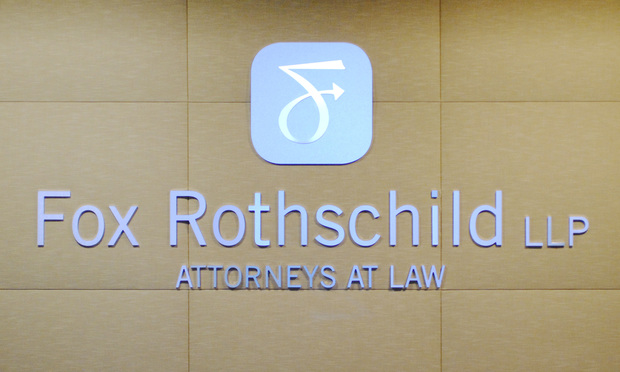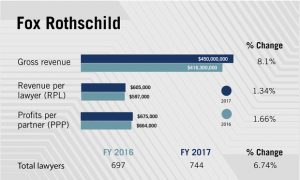Fox Rothschild Grows Revenue 8 Percent, PPP Up 1.7 Percent
Managing partner Mark Morris said the firm had a strong 2017.
April 20, 2018 at 06:19 PM
5 minute read

Fox Rothschild was able to grow its profits slightly in 2017, despite an increase in expenses, thanks to strong revenue growth for the year.
The firm grew revenue by 8.1 percent, to $450 million, in what firmwide managing partner Mark Morris said was a strong fiscal year that ended March 31. Revenue per lawyer increased by 1.3 percent, to $605,000.
Profits per equity partner were up 1.7 percent, reaching $675,000, while net income increased by 3.8 percent.
Morris said the firm measures its success more by the average compensation for all partners, which was $569,000, an increase of 3.6 percent from fiscal 2016.
(The firm's final financial results don't necessarily match estimates reported in the May issue of Legal affiliate The American Lawyer, which collects its data before Fox Rothschild's year-end.)
 Head count grew by 6.7 percent, or 47 lawyers, reaching 744. Many of those additions were nonpartners, as the equity partner tier grew by four, to 191, and the nonequity tier by five, to 110.
Head count grew by 6.7 percent, or 47 lawyers, reaching 744. Many of those additions were nonpartners, as the equity partner tier grew by four, to 191, and the nonequity tier by five, to 110.
Early in its fiscal year the firm gained a foothold in the Pacific Northwest, absorbing Seattle-based Riddell Williams, a 39-lawyer firm with corporate, employment, financial services, litigation and real estate practices.
Aside from that deal, the firm spent much of its energy in 2017 on catching up with its growth from recent years.
Fox Rothschild completed its largest-ever merger in January 2016, acquiring 82-lawyer Oppenheimer Wolff & Donnelly in Minneapolis. It then hired five other partners in Minneapolis and recruited a six-lawyer entertainment team in the Twin Cities and New York. Fox Rothschild's New York office also brought on a three-lawyer intellectual property group from Kenyon & Kenyon in 2016 and a six-lawyer startup group from Dentons in March 2017.
Last year the firm gained new office space in West Palm Beach, Florida, and Los Angeles, and expanded its office in New York. The firm also launched industry initiatives in data privacy and security, gaming, emerging companies and medical technology and devices, Morris said, which required some investment.
“We really made headway in sort of completing our integration and getting a handle on the operational aspects of our firm that looks a lot different than it did five years ago,” Morris said. It was helpful that the firm met budget on revenue, he said, adding that the firm also exceeded budget slightly in terms of partner distributions.
Morris said the firm raised standard rates modestly, but also saw an uptick in the utilization of alternative fee arrangements.
“The firm doesn't take all of the risk … it's a sharing of the risk,” he said. “Our CFO and our COO are actively involved in project management. We also involve the department chairs where necessary.”
The firm's strongest practices were intellectual property, tax controversy, entertainment and cybersecurity, Morris said, but no individual matters accounted for their performance. Cybersecurity, in particular, is a growth area, he said, as businesses seek assistance on compliance issues.
Meanwhile, he said, bankruptcy was slower, in keeping with industrywide trends. And general commercial litigation was down a little bit, he said, likely because the economy is doing well and parties are less likely to go to trial.
National Stage
Morris said he expects the firm to continue growing, especially in the locations where it already has lawyers. That doesn't mean the firm won't expand into new markets, he said, but it will approach those decisions opportunistically.
“We think we have an investment now in the infrastructure,” he said. “The way to yield the return on that investment is to add to the offices we have.”
He said the firm is always in dialogues with groups about potential combinations, and has spoken to two or three smaller firms recently, but no mergers are imminent.
Morris said he also wants to continue improving internal operations and finding ways to be more efficient. The firm will also look for ways to manage its costs in lower-rate practices, he said, but has no plans to abandon work in those areas.
Fox Rothschild remains a firm for middle-market clients, but its competition has changed somewhat, Morris said.
“I wouldn't say our competition is all the firms in Philadelphia,” he said. “That's where it's changed … now our competition are national firms that have similar clientele.”
This content has been archived. It is available through our partners, LexisNexis® and Bloomberg Law.
To view this content, please continue to their sites.
Not a Lexis Subscriber?
Subscribe Now
Not a Bloomberg Law Subscriber?
Subscribe Now
NOT FOR REPRINT
© 2025 ALM Global, LLC, All Rights Reserved. Request academic re-use from www.copyright.com. All other uses, submit a request to [email protected]. For more information visit Asset & Logo Licensing.
You Might Like
View All
Linklaters Duo Jumps to Reed Smith's Structured Finance Practice

Big Law Expected To Follow Milbank's Lead With Associate Year-End Bonuses


Are Lead Attorney Relationships More Important Now Than Law Firm Brands?
7 minute readTrending Stories
- 1Avantia Publicly Announces Agentic AI Platform Ava
- 2Shifting Sands: May a Court Properly Order the Sale of the Marital Residence During a Divorce’s Pendency?
- 3Joint Custody Awards in New York – The Current Rule
- 4Paul Hastings, Recruiting From Davis Polk, Adds Capital Markets Attorney
- 5Chancery: Common Stock Worthless in 'Jacobson v. Akademos' and Transaction Was Entirely Fair
Who Got The Work
J. Brugh Lower of Gibbons has entered an appearance for industrial equipment supplier Devco Corporation in a pending trademark infringement lawsuit. The suit, accusing the defendant of selling knock-off Graco products, was filed Dec. 18 in New Jersey District Court by Rivkin Radler on behalf of Graco Inc. and Graco Minnesota. The case, assigned to U.S. District Judge Zahid N. Quraishi, is 3:24-cv-11294, Graco Inc. et al v. Devco Corporation.
Who Got The Work
Rebecca Maller-Stein and Kent A. Yalowitz of Arnold & Porter Kaye Scholer have entered their appearances for Hanaco Venture Capital and its executives, Lior Prosor and David Frankel, in a pending securities lawsuit. The action, filed on Dec. 24 in New York Southern District Court by Zell, Aron & Co. on behalf of Goldeneye Advisors, accuses the defendants of negligently and fraudulently managing the plaintiff's $1 million investment. The case, assigned to U.S. District Judge Vernon S. Broderick, is 1:24-cv-09918, Goldeneye Advisors, LLC v. Hanaco Venture Capital, Ltd. et al.
Who Got The Work
Attorneys from A&O Shearman has stepped in as defense counsel for Toronto-Dominion Bank and other defendants in a pending securities class action. The suit, filed Dec. 11 in New York Southern District Court by Bleichmar Fonti & Auld, accuses the defendants of concealing the bank's 'pervasive' deficiencies in regards to its compliance with the Bank Secrecy Act and the quality of its anti-money laundering controls. The case, assigned to U.S. District Judge Arun Subramanian, is 1:24-cv-09445, Gonzalez v. The Toronto-Dominion Bank et al.
Who Got The Work
Crown Castle International, a Pennsylvania company providing shared communications infrastructure, has turned to Luke D. Wolf of Gordon Rees Scully Mansukhani to fend off a pending breach-of-contract lawsuit. The court action, filed Nov. 25 in Michigan Eastern District Court by Hooper Hathaway PC on behalf of The Town Residences LLC, accuses Crown Castle of failing to transfer approximately $30,000 in utility payments from T-Mobile in breach of a roof-top lease and assignment agreement. The case, assigned to U.S. District Judge Susan K. Declercq, is 2:24-cv-13131, The Town Residences LLC v. T-Mobile US, Inc. et al.
Who Got The Work
Wilfred P. Coronato and Daniel M. Schwartz of McCarter & English have stepped in as defense counsel to Electrolux Home Products Inc. in a pending product liability lawsuit. The court action, filed Nov. 26 in New York Eastern District Court by Poulos Lopiccolo PC and Nagel Rice LLP on behalf of David Stern, alleges that the defendant's refrigerators’ drawers and shelving repeatedly break and fall apart within months after purchase. The case, assigned to U.S. District Judge Joan M. Azrack, is 2:24-cv-08204, Stern v. Electrolux Home Products, Inc.
Featured Firms
Law Offices of Gary Martin Hays & Associates, P.C.
(470) 294-1674
Law Offices of Mark E. Salomone
(857) 444-6468
Smith & Hassler
(713) 739-1250





